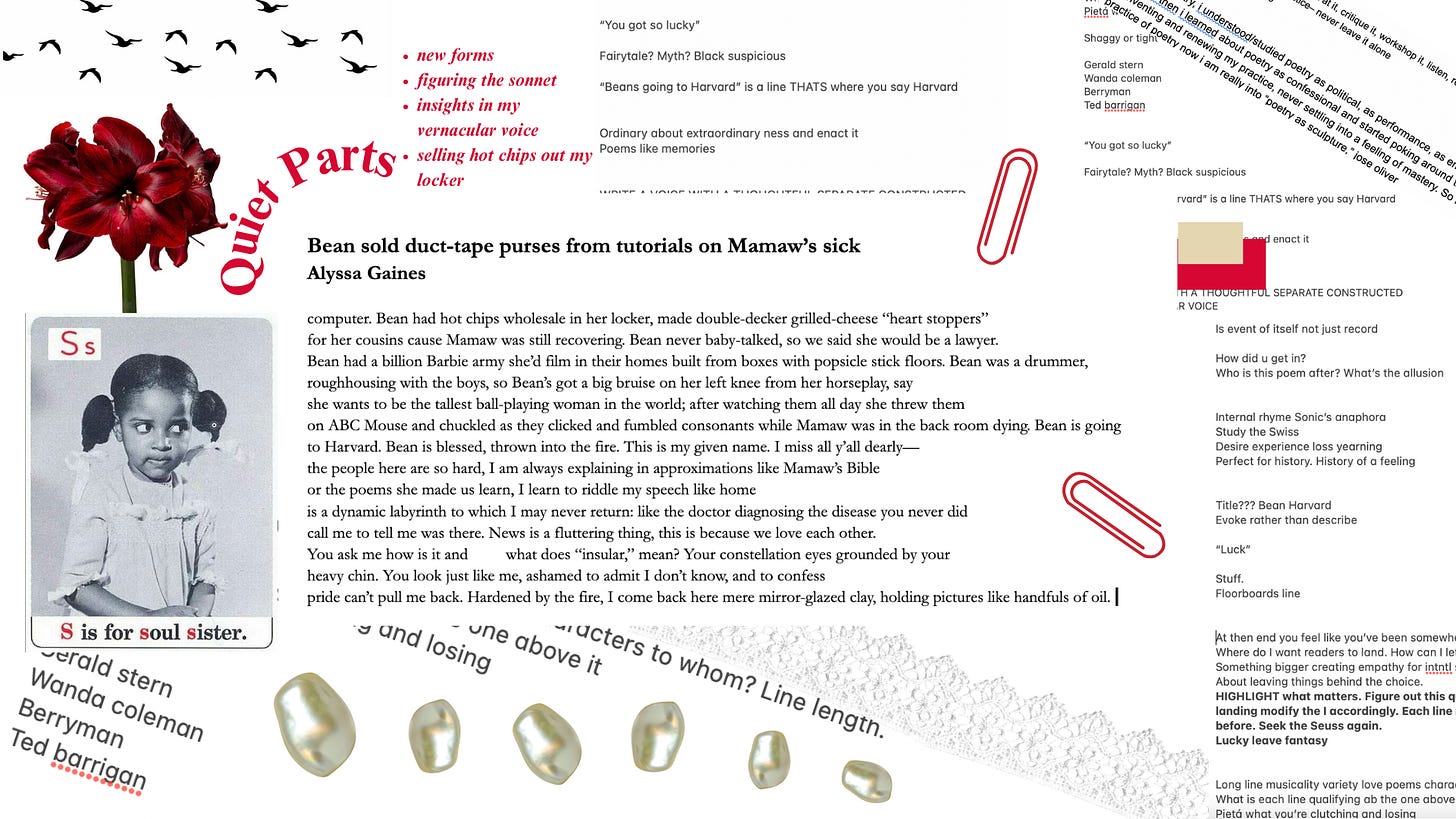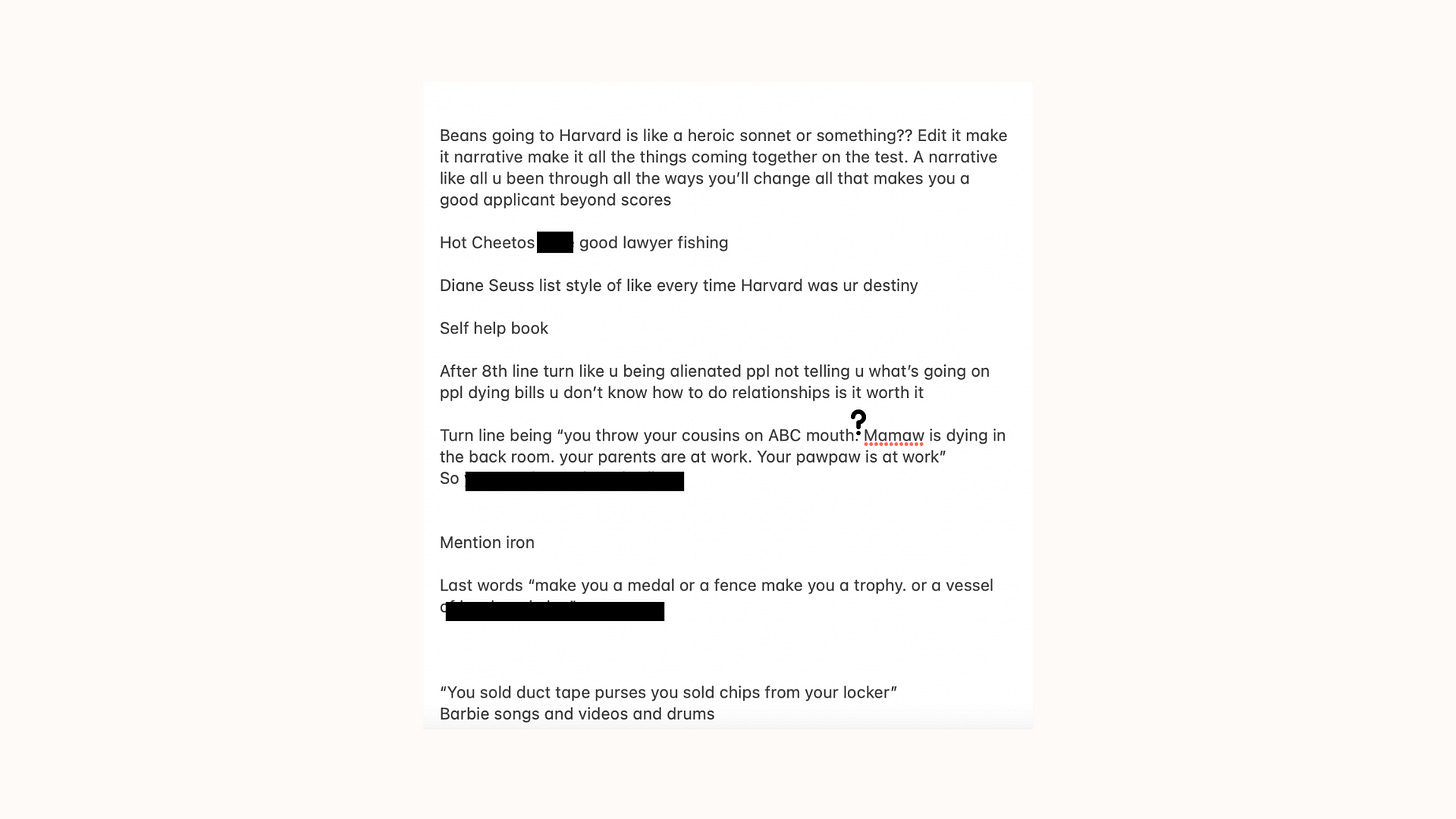Legumes, Ivy League, American Sonnetry, Procrastination!
Poet's Studio: my informal formal education, Diane Seuss "I have slept in many places, for years on mattresses that entered," the way I work things out.
Because my longer post about Ornamentalism is becoming quite precious to me (always a bad sign in my experience with writing) and I am delighting too much in the idea itself and all that surrounds the act of pinning it to the ground with a stake and ripping it gloriously apart. Because my weekly long-form essay is taking so so so long to materialize, I am forcing myself to do another thing.
This other thing is posting about my poetry, my drafting and editing processes, and my journey To Be A Better Writer… about which I am also unfortunately very precious, but alas, something’s got to give around here so I confess I have been really into the American sonnet.
Well, actually, I’m lying. Recently, I’ve been into beat poetry and understanding it for the first time. (PURE COINCIDENCE PLEASE… my move to Brooklyn… Brooklyn Baby… “getting down to beat poetry”… you’ll have to take me at my word but I promise this is one of the naturally-ocurring fated serendipities that draw me to a certain woman’s music and I am morally opposed to any sort of procedural inverse).
But! before the beat poetry, I started getting really into the American sonnet. Maybe I am late, I always am to these things. My poetry journey began in slam when I was literally only eight and now I’m only 21. The most challenging part is the most rewarding part: understanding that there is always so much for me to continuously learn and return and re-learn especially about craft.
It’s so exciting to always be able to learn so much. I got really decently relatively good at one piece and still, I’m able to start over like a child again at each other piece. My practice never gets old. More musings on this from my working Google Doc below.
Either way, my readerly mind is on beat poetry, my writerly mind is on the sonnet. Poetry is endless. There is always more wisdom to enrich your practice, there is always more history and more form. I stumbled upon this particular form through a repeat episode of The New Yorker: Poetry I listened to while driving my car around Indianapolis before my move. Dobby Gibson read Diane Seuss’s 2020 “I have slept in many places, for years on mattresses that entered,” of course, from The New Yorker archive.
I listened to the same episode twice in a week. I could not stop thinking about all the delicious lines that run rambling—not in an illocutionary sense, but closer to what a “brook,” might do— through the poem’s “wet sheets,” “crickets and chicken bones in ditches,” and “crumbling castle.”
The poem drags you through a lifetime of lies and truth. I love the revelation of the “clubhouse circled by crab-apple trees with high-school boys who are now members of a megachurch,” the megachurch next to the “hotel bathtub in St. Augustine’s,”—all so plausible and unbelievable at once. Life is so absurd in all the places it drags us through.
I chased my obsession with this form down. I read Wanda Coleman, I read all the bits and pieces of frank: sonnets I could find. I listened to a million podcasts on the American sonnet, I gushed over Seuss herself, I listened to her on This is Just to Say reading “Song in My Heart,” talking through her post-divorce process.
…I listened to the same episode twice in a week. I could not stop thinking about all the delicious lines that run rambling—not in an illocutionary sense, but closer to what a “brook,” might do— through the poem’s “wet sheets,” “crickets and chicken bones in ditches,” and “crumbling castle”…
If I remember correctly, she mentioned in this episode some detail of sentences following her around and at the same time I was being haunted by the refraining line: “Bean’s going to Harvard.” My auntie calls me “bean,” I got into Harvard right after my Mamaw died, she could have likely said this to someone at some point. “Bean.” A disorienting sentence. Legumes don’t go Ivy League.
It’s weird coming home, every single time, and yet, it’s almost weirder being at school and realizing that the life I live there is my life too. I won’t explain the poem. I’m a better poet than an explainer probably.
At the same time I was returning to a poem from three years ago I began after the SFFA decision, became precious about, and therefore could not finish. The poem was called “Literature Test,” and was compelling in form despite being absolutely terrible in lyric. I wanted to adjust the poem part’s structure, before I realized the rest of the poem was bad too. I wanted to change its title. From “Literature Test,” to “Bean’s Going to Harvard,” and let the immediate legibility, straightforward black-and-white, of the form counteract the messiness of the words.
I thought instead about a list poem. “Bean’s going to Harvard,” and then spending my time answering the question: Who is Bean? Who is Bean?
Bean sold hot chips from her locker, Bean would make a good lawyer. Does Bean deserve to go to Harvard? Hasn’t she always? Is Bean, Bean still? That’s where I was at about it.
The original poem of “Literature Test,” utilized a more classical form, and I thought it fit the poem’s visual structure and its argument about merit and representation. I thought it was interesting to make a cultural argument in a classically inaccessible, regulatory, regimented cultural framework.
American Sonnet for My Past and Future Assassin [“I lock you in an American sonnet that is part prison”]
by Terrance Hayes
I lock you in an American sonnet that is part prison,
Part panic closet, a little room in a house set aflame.
I lock you in a form that is part music box, part meat
Grinder to separate the song of the bird from the bone.
I lock your persona in a dream-inducing sleeper hold
While your better selves watch from the bleachers.
I make you both gym & crow here. As the crow
You undergo a beautiful catharsis trapped one night
In the shadows of the gym. As the gym, the feel of crow-
Shit dropping to your floors is not unlike the stars
Falling from the pep rally posters on your walls.
I make you a box of darkness with a bird in its heart.
Voltas of acoustics, instinct & metaphor. It is not enough
To love you. It is not enough to want you destroyed.
The American sonnet for my second approach at the theme did a similar thing though I was developing a better grasp of its offerings and preferred all it allowed me to accomplish instead. I took notes on what sonnets allow in terms of internal rhyme, “sonics, anaphora,” what space Kevin Young says they make for “desire, experience, loss, yearning,” and how he said they were perfect for history. “Not history qua history, but the history of a feeling.”
I ended up loving what “Bean’s Going to Harvard,” was starting to become in my mind. I took notes at stoplights on the podcast once I knew what it was I wanted to do. I wrote this draft in the parking lot of Bento Café on 116th, directly after Seuss, then I drove some more listening to Kevin Young historicize the American sonnet. I wrote down the names of people he said pioneered the form, each working separately though allowing their work to coalesce into a novel American subgenre.
Wanda Coleman. I listened to Ada Limón read Wanda Coleman on The Poet Salon as I drove some more. Stoplight edits, more studying the black American sonnet, learning through practice. I wrote the questions:
Who do you answer to?
What do you merit?
I wrote a couple more drafts that night that exist out of order in a Google Doc with the most recent at the top. I put my favorites into the former form of “Literature Test” and they looked ugly in the old exoskeleton. I abandoned the visuality entirely. For now.
In edits I highlighted problem spots, I wrote a list:
highlight what you like
what works in sonnets, what do you want to do with it?
what feeling are you historicizing? leaving home to pursue some “greater” aim
visit the word “luck” in the seuss. go line by line with the “seuss,” think of the “stuff” of seuss’s sonnets. floorboards.
how can you let readers in? you not the i
think about your perspectival goals? empathy for people accepted into elite institutions? why? how? why? they aren’t all removed from real world, for some it’s a privilege, and represents broadly a hard choice people can empathize with in narrative about moving up? no, forward? leaving the place and people you come from in some way
you want the reader to feel that someone they loved is leaving and it’s beautiful and it’s sad, and they are somehow that someone in some way sometimes too?
think of the point of a sonnet. historically love poems. who are your characters? who do they love?
what does each line qualify about the one above it?
what are you clutching, what have you sacrificed, what are you scared to lose?
what’s ordinary, what’s extraordinary, what pieces of each exist in either?
Somehow here we are with the poem. Working her out. Here is a peek into my process. I acknowledge poetry is much worse this way. But then again, I have not finished the Ornamentalism piece. Here is my punishment.
thank you for all your patience, hopefully some part of this is at all interesting to you in lieu of my normal buttoned-up art history deep dives.
Best,
Lyssie!
**If you are new to Quiet Parts, I am a 21-year old poet, and Quiet Parts is my reader-powered poet’s studio where I do things like share poetry, write long essays, publish my newsletter, and curate guides and recommendations that inspire me.
Once I was the National Youth Poet Laureate, now I am legally an adult and yet so much more a baby than I was. Amongst other things, I am experimenting with form and inspiration and developing a consistent writing practice. For exclusive access to me and my content consider becoming a paid Quiet Patron or perhaps funding the caffeine that sustains my practice.
Thank you for reading so far, I’m so happy you’re here.**














“Getting to know you”. You have such enriching talents, and you share them so freely.